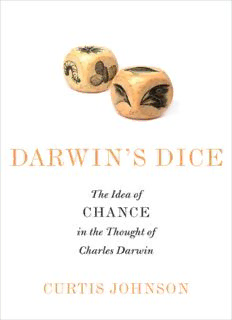
Darwin's Dice: The Idea of Chance in the Thought of Charles Darwin PDF
Preview Darwin's Dice: The Idea of Chance in the Thought of Charles Darwin
Darwin’s Dice i Darwin’s Dice The Idea of Chance in the Thought of Charles Darwin Curtis Johnson i 1 1 Oxford University Press is a department of the University of Oxford. It furthers the University’s objective of excellence in research, scholarship, and education by publishing worldwide. Oxford New York Auckland Cape Town Dar es Salaam Hong Kong Karachi Kuala Lumpur Madrid Melbourne Mexico City Nairobi New Delhi Shanghai Taipei Toronto With offices in Argentina Austria Brazil Chile Czech Republic France Greece Guatemala Hungary Italy Japan Poland Portugal Singapore South Korea Switzerland Thailand Turkey Ukraine Vietnam Oxford is a registered trademark of Oxford University Press in the UK and certain other countries. Published in the United States of America by Oxford University Press 198 Madison Avenue, New York, NY 10016 © Oxford University Press 2015 All rights reserved. No part of this publication may be reproduced, stored in a retrieval system, or transmitted, in any form or by any means, without the prior permission in writing of Oxford University Press, or as expressly permitted by law, by license, or under terms agreed with the appropriate reproduction rights organization. Inquiries concerning reproduction outside the scope of the above should be sent to the Rights Department, Oxford University Press, at the address above. You must not circulate this work in any other form and you must impose this same condition on any acquirer. Library of Congress Cataloging-in-Publication Data CIP data is on file at the Library of Congress ISBN 978–0–19–936141–0 9 8 7 6 5 4 3 2 1 Printed in the United States of America on acid-free paper For my family i Contents Acknowledgments ix Introduction xi 1. Two faces of chance 1 2. Chance transport 27 3. Causes and laws of variations 48 4. Chance, nature, and intelligence 72 5. Darwin’s evolving views about chance 89 6. “So-Called Spontaneous Variation” 115 7. Darwin’s architect metaphor 136 8. Darwin’s giraffes 160 9. Chance and free will 189 10. Chance and human morality 205 Appendix: The Primary Sources 229 Bibliography 233 General index 245 Index Nominum 249 vii Acknowledgments i the systematic study of chance in nature’s operations has an ancient pedigree, dating back at least to the writings of Empedocles (5th c. BCE) and Aristotle (4th c. BCE). If one were permitted to acknowledge debts to the no longer living, I would begin by acknowledging them. It is not simply that they wrestled with the idea of chance in nature; they did so in just the way Darwin did. Darwin himself was not directly influenced by these authors. I doubt he ever read anything by Empedocles, and his acquaintance with Aristotle’s writings came only late in his life, long after he had developed and refined his own ideas. But these two ancient thinkers put a Darwinian sort of chance into a long tradition of thought that is with us still. Any work of this sort could not be undertaken without the insights of other scholars laboring in the fields. It would be impossible to give an exhaustive account of what I owe to all of these men and women, but I refer the interested reader to the bibliography for a register of most of my debts to other authors. Several of these stand out for special mention: the volume of collected essays edited by Gigerenzer, G. et al., eds., 1989; a two volume work edited by Krueger and Morgan, 1987; and several individual works by those whom I regard as leading authorities in the study of chance in evolutionary biology today, especially John Beatty, James Lennox, and Roberta Millstein. I have no personal acquaintance with any of these authors but my work has benefited beyond measure by the foundations laid by them. ix
